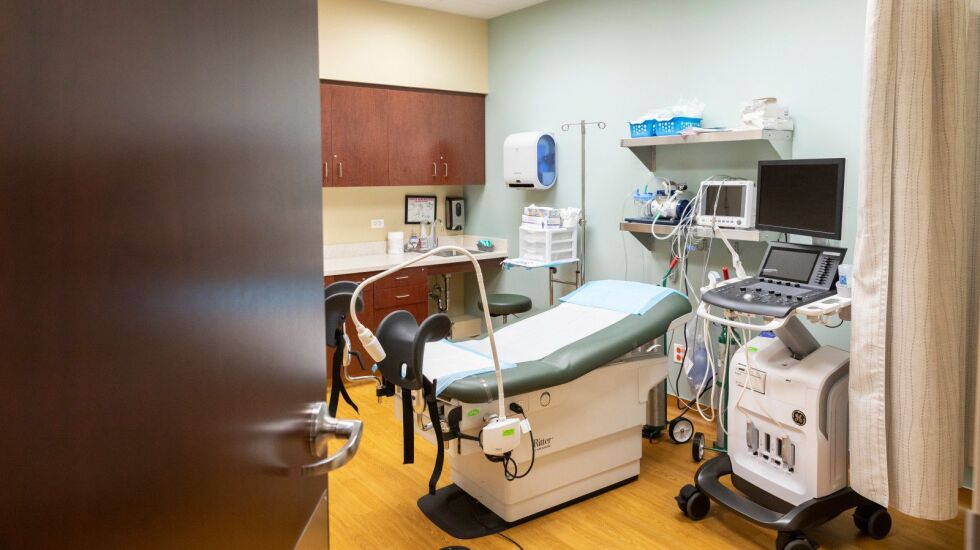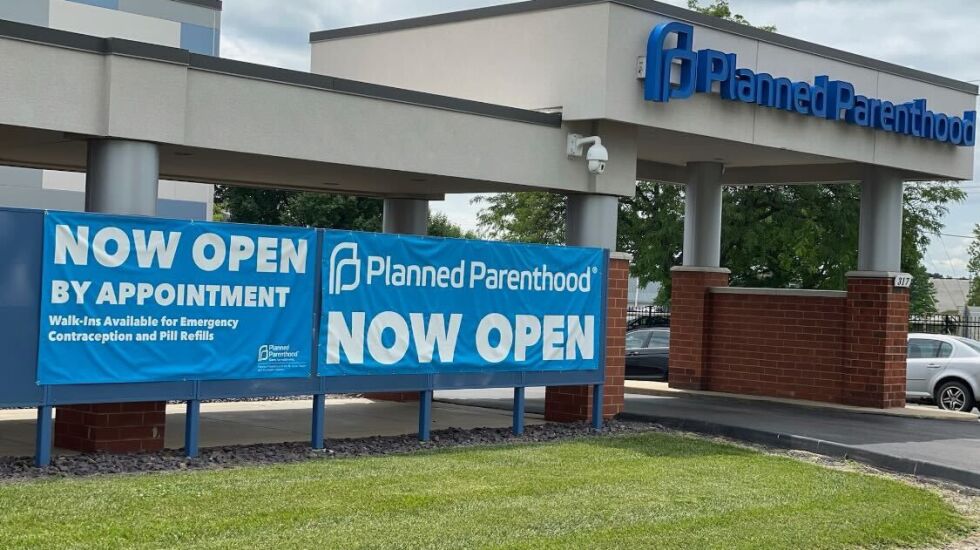
On a recent afternoon, Ezra Figueroa is giving a tour of Planned Parenthood of Illinois’ clinic in Waukegan, about 20 minutes from the Wisconsin border.
The space is big and, except for the Michael Jackson tunes and other hits playing in the background, quiet. There are hardwood floors throughout, and exam rooms typical of a doctor’s office.
There’s also a shiny, silver vault in the break room that Figueroa, the assistant health center manager, is unsuccessfully trying to open.
“Can’t get inside of it,” Figueroa said. “I really wish we could. But it’s really cool to just have here.”
The vault is a reminder of what this health center used to be — a bank on a busy retail strip. Two years ago, Planned Parenthood of Illinois opened the clinic in the former bank with Wisconsin in mind. Were Roe v. Wade overturned — as it was in June — a Wisconsin law would largely strip away access to abortion in that state. And that’s what happened immediately.
As a result, Planned Parenthood organizations in Illinois and Wisconsin recently announced a deal under which more than a dozen employees from Wisconsin — including doctors, nurses and medical assistants — now commute to Waukegan. Some come a few times a week, some a few times a month.
“It really required this perfect pairing of supply and demand,” said Kristen Schultz, Planned Parenthood of Illinois’ chief strategy and operations officer. “They had capacity without local demand, and we had the opposite.”
The idea is to preserve access to abortion for Wisconsin residents while helping out the Waukegan clinic as Illinois becomes a greater oasis for abortion care. Since the Supreme Court overturned Roe v. Wade in June, dozens of abortion clinics have closed across the nation as 11 states across the South and Midwest imposed bans, according to the Guttmacher Institute, a nonprofit advocacy organization that supports abortion rights and tracks the issue.
The influx of patients into Illinois has had another impact. For years, abortion providers have been traveling to other states, including Mississippi and Oklahoma, where their help has been needed more. They would fly in once or twice a month to perform abortions, then return home.
Dr. Laura Laursen, a Chicago obstetrician and gynecologist, was one of them.
“Now, the script is totally flipped,” said Laursen, who is a fellow with Physicians for Reproductive Health. “This is where you are needed more than anywhere else.”
Making the long commute
Outside the Waukegan clinic along busy Lewis Avenue, two people demonstrated silently as cars zoomed past. They were shielded by bushes that essentially blocked them from view from the Planned Parenthood center. They said they drove from the Milwaukee area and plan to do so a few times a week now that they’re not needed as much in Wisconsin.
“These babies deserve to be protected,” said one of the demonstrators, who gave only her first name, Anne. “We’re hoping some women change their minds.”
Anti-abortion groups are opposing the Planned Parenthood partnership and are preparing for a marathon-long fight if necessary to attempt to restrict abortion rights in Illinois. In a statement after the organizations’ announcement, Amy Gehrke, executive director of Illinois Right to Life, called it “particularly tragic.”
Natalee Hartwig is a nurse midwife and associate director of clinical services for Planned Parenthood of Wisconsin. In late July, she was driving, on average, two days a week to Illinois, working in Waukegan or training in Aurora to provide medication abortion.
As she prepared to head to Illinois recently, she described how her routine has changed.
“I’m going to leave way before he wakes up — my son — so I’ll leave at 5:30 in the morning,” Hartwig said. “Luckily, it’s summer. For now, he can sleep in. But any getting ready that has to happen will be on my spouse.”
The drive takes at least two hours from her home in Madison. During the long commute, she distracts herself with audiobooks and podcasts that are not about abortion.
“This was really just what I was always supposed to do,” Hartwig said. “There’s nothing that’s going to keep me from helping our patients.”
In her view, providing abortions should be part of her practice since she already delivers babies and takes care of pregnant patients.
But Wisconsin doesn’t allow nurses like Hartwig with advanced degrees to perform abortions. Illinois allows them to perform medication abortion, according to the state Department of Financial and Professional Regulation. So now Hartwig is traveling to Illinois to do so.
Dr. Kathy King, Planned Parenthood of Wisconsin’s medical director, said her staff is dedicated to providing these services but that it comes at a cost.
“It is a burden on our clinicians and nurses and medical assistants who have young children at home,” King said. “It sounds great. Sure, we’ll all just travel down to Waukegan five days a week. But the logistics of that and the sacrifice of doing that on just people’s day-to-day lives takes a toll.”
With staff from Wisconsin, the Waukegan clinic has doubled the number of abortion appointments available, and it’s still ramping up. This also frees staff members to treat patients who come for other needs, like birth control and cancer screenings.
There has been a burst of patients from Wisconsin for abortion appointments at all Planned Parenthood of Illinois clinics — a tenfold increase since Roe was overturned, from about 35 patients a month to 350, King said. That doesn’t include Wisconsin residents who might have sought abortions with other providers.
The Waukegan clinic sees more out-of-state patients for abortions than any other Planned Parenthood of Illinois health center, according to Schultz.
The Waukegan clinic also has sparked interest from abortion providers in other states. Planned Parenthood of Illinois is fielding calls from those in Indiana, Kentucky and Ohio, for example, Schultz said.
To treat more people, Planned Parenthood of Illinois needs more staff. Where will those additional employees come from? The commute from Wisconsin to Waukegan is relatively short compared to what it would be for abortion providers in Ohio to make the drive to Illinois.
To help facilitate such partnerships, the National Abortion Federation — which has about 500 facility members, including independent abortion clinics and hospitals — has become a matchmaker of sorts. The organization is pairing people looking for jobs at abortion clinics with clinics that need workers, from doctors to staffers who answer phones, said Melissa Fowler, the federation’s chief program officer.
Moving isn’t an option for everyone, Fowler said.
“People have lives,” she said. “They have families. They’re deeply rooted in their communities, and they’ve chosen to live there on purpose. And so a situation like you’re seeing in Illinois and Wisconsin is great because people are able to stay connected to their community, not have to move their family and still be able to provide care.”

A similar cross-state effort downstate
In southwestern Illinois, many who work in a clinic in Fairview Heights live across the border in St. Louis. It’s a roughly 30-minute commute for Dr. Colleen McNicholas, chief medical officer of Planned Parenthood of the St. Louis Region and Southwest Missouri.
Early in her career, McNicholas frequently traveled to Kansas to provide abortions. Later, she’d go to Oklahoma to do so.
Now, she’s seeing whose expertise she can bring to Fairview Heights, such as doctors and clinic managers in Arkansas who, in a post-Roe world, find themselves working in a state that has banned nearly all abortions. There’s been a big rise recently in the number of patients from Arkansas, Tennessee and Mississippi seeking abortions in Fairview Heights.
“The volume of patients that we are now going to be seeing does demand that we are going to not only ramp up our offerings or services but also who’s going to provide those services,” McNicholas said.
Before the Supreme Court overturned Roe, waits to get an appointment for an abortion typically were about three days. Now, the wait is typically about three weeks at a clinic that provides abortions six days a week, eight hours a day.
If the expected crush of out-of-state patients happens, Fairview Heights might open for abortion care seven days a week, 12 hours a day.
“Even that might not be enough to give as quick of access as we would like to,” McNicholas said.







